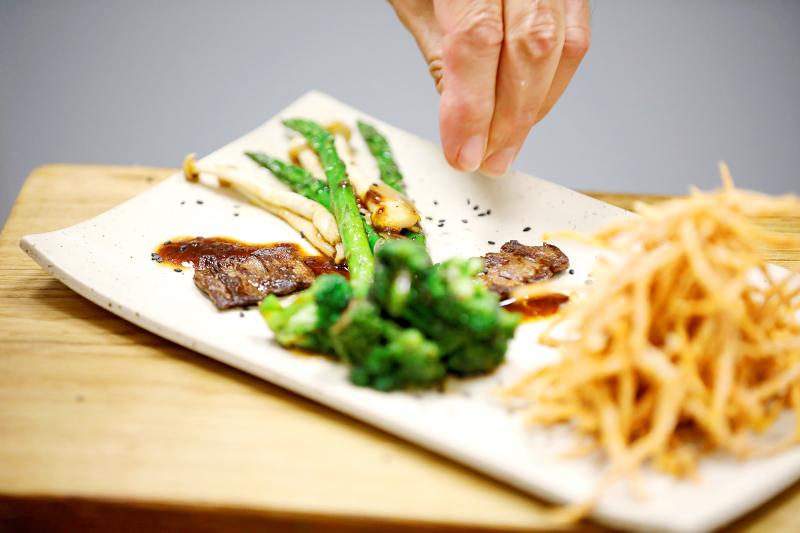Mitsubishi Corp has agreed to partner with Israel’s Aleph Farms Ltd to lay the groundwork for bringing lab-grown beef to Japan, where demand for meat is growing.
The two companies are to work on tailoring Aleph’s beef — grown in vats from muscle cells of living animals — to the tastes and nuances of Japanese consumers and regulatory bodies, Aleph chief executive officer Didier Toubia said in an interview from his office in Rehovot, Israel.
They would then use Mitsubishi’s manufacturing capabilities to scale up production and distribution, he said.

Photo: Reuters
Aleph, whose investors include US food giant Cargill Inc, plans to sell its initial batch of lab-grown meat to consumers in Asia next year, with Japan being “high on the list” of target countries, Toubia said.
Toubia declined to provide further details about the companies’ arrangements or plans to obtain regulatory approval. Mitsubishi spokespeople declined to comment.
The partnership reflects the strides made by the so-called cultivated meat industry, which arose mainly in response to animal rights and environmental concerns. Aleph is among about 60 start-ups jockeying to sell meat or poultry that bypass the abattoir and modern, industrial-scale farming, and countries are starting to open pathways to consumers.
Tokyo-based Mitsubishi, which had US$15.6 billion in food sales in the 12 months through March last year, is tapping an industry that is expected to grow.
The cell-based meat market is projected to reach US$140 billion in the next decade, according to forecasts compiled by Blue Horizon Corp, which invests in alternative proteins.
That is still nowhere near the size of the meat industry, which was US$1.3 trillion last year, according to Global Data.
High production costs and consumer skepticism over taste and health implications are among the biggest barriers to accelerated growth.
Governments must also be convinced. Last month, Singapore became the first nation to approve the sale of cultured meat.
Israeli Prime Minister Benjamin Netanyahu is supportive of the sector — he visited an Aleph factory last month and tried its cultivated steak as part of his initiative to promote the country’s start-ups in the sector.
Still, Aleph is not rushing its product to market and is particularly mindful of the specific preferences of the Japanese market, famed for its Wagyu beef.
“We might be the third or fourth company to release a product, but that’s because we’re focused on consumer acceptance,” Toubia said. “They have high expectations for their meat, and we want to get it right.”

To many, Tatu City on the outskirts of Nairobi looks like a success. The first city entirely built by a private company to be operational in east Africa, with about 25,000 people living and working there, it accounts for about two-thirds of all foreign investment in Kenya. Its low-tax status has attracted more than 100 businesses including Heineken, coffee brand Dormans, and the biggest call-center and cold-chain transport firms in the region. However, to some local politicians, Tatu City has looked more like a target for extortion. A parade of governors have demanded land worth millions of dollars in exchange

An Indonesian animated movie is smashing regional box office records and could be set for wider success as it prepares to open beyond the Southeast Asian archipelago’s silver screens. Jumbo — a film based on the adventures of main character, Don, a large orphaned Indonesian boy facing bullying at school — last month became the highest-grossing Southeast Asian animated film, raking in more than US$8 million. Released at the end of March to coincide with the Eid holidays after the Islamic fasting month of Ramadan, the movie has hit 8 million ticket sales, the third-highest in Indonesian cinema history, Film

BIG BUCKS: Chairman Wei is expected to receive NT$34.12 million on a proposed NT$5 cash dividend plan, while the National Development Fund would get NT$8.27 billion Taiwan Semiconductor Manufacturing Co (TSMC, 台積電), the world’s largest contract chipmaker, yesterday announced that its board of directors approved US$15.25 billion in capital appropriations for long-term expansion to meet growing demand. The funds are to be used for installing advanced technology and packaging capacity, expanding mature and specialty technology, and constructing fabs with facility systems, TSMC said in a statement. The board also approved a proposal to distribute a NT$5 cash dividend per share, based on first-quarter earnings per share of NT$13.94, it said. That surpasses the NT$4.50 dividend for the fourth quarter of last year. TSMC has said that while it is eager

‘IMMENSE SWAY’: The top 50 companies, based on market cap, shape everything from technology to consumer trends, advisory firm Visual Capitalist said Taiwan Semiconductor Manufacturing Co (TSMC, 台積電) was ranked the 10th-most valuable company globally this year, market information advisory firm Visual Capitalist said. TSMC sat on a market cap of about US$915 billion as of Monday last week, making it the 10th-most valuable company in the world and No. 1 in Asia, the publisher said in its “50 Most Valuable Companies in the World” list. Visual Capitalist described TSMC as the world’s largest dedicated semiconductor foundry operator that rolls out chips for major tech names such as US consumer electronics brand Apple Inc, and artificial intelligence (AI) chip designers Nvidia Corp and Advanced